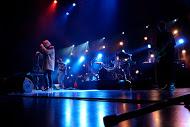The build-up towards Matisyahu’s performance in Madison finally came full circle when he and Nadim Azzam performed at The Overture Center Wednesday night.
His show was by all means strange, but it was backed by a powerful message — the spirituality of a Jewish artist performing with one of Palestinian descent.
Before his performance, he stopped by the campus Hillel building on Langdon Street to eat lunch with a select group of students, all of whom represent different multicultural and leadership organizations on campus. With organizations spanning from Associated Students of Madison to First Wave, the room was vibrant with questions for the musician.
Matisyahu talked about simple topics like his favorite color, but he also discussed more complex ones such as being protested by the Boycott, Divestment and Sanctions Movement — a global campaign dedicated to increasing pressure on Israel to end its occupation of Palestine, according to its website.
Matisyahu, Nadim Azzam promote coexistence through joint tour in Madison
For selected students, the Q&A forum was great for meeting the artist, but it wasn’t until his performance that they were able to see him express his artistic side in a confusing, yet captivating way.
Nadim Azzam was the first to come out. In what seemed like an Ed Sheeran turned rap concert, he walked on stage playing acoustic guitar and rapping. But it was somber, as he described each song to be extremely personal. He set a sad stage for Matisyahu, but his pleasant voice and introspective lyrics seemed appropriate for the madness that followed.
In Matisyahu’s set, he played a total of six songs, but each were 15-minute long jam sessions with complex forms consisting of buildups, breakdowns and beat-boxing — the last of which he did himself.
The artist was comfortable being surrounded by the music provided by his accompanying band, as he sunk into the rhythms while he performed. Feeling music like that was impressive, but it didn’t absolve Matisyahu in the eyes of the crowd from standing perfectly still and incoherently singing in his reggae voice. His overall stillness and lack of emotion was confusing and didn’t quite fit the ardent platform of love and peace.
He also didn’t play a single song off of his hit album Youth, and while it was a shame, his band made up for it by jamming out for the extent of the performance.
Matisyahu was able to salvage his own performance through his beat-boxing. Performed with incredible skill, this beat-boxing was what kept Matisyahu’s individual performance relevant and cool. Every time he incorporated his vocal prowess of beatboxing, he elevated his music as a whole. He managed to attack all parts of the beat while even building up with his band — an incredibly challenging feat.
While Matisyahu may not have the same traction he did after Youth was released, the beat-boxing alone left the audience wanting more, which hopefully he’ll deliver in the future.
The originality of the concert didn’t end at the beat boxing. The next coolest part of the increasingly eclectic performance was the addition of a sitar, an Indian plucked-string instrument, to a beat box addled-jam. The multi-faceted drummer Tim Keiper rocked the sitar and turned what was a dubiously spiritual performance into one that had real legitimacy.
During one of their interstellar jams, Azzam joined the fun with some rapping which was stylistically the same as the great Twista. He even claimed the verse was “off the dome,” which deserved major props for adding his own talent harmoniously into the background of noise.
It would have been nice if Matisyahu explained why he was playing this college tour because without that, things didn’t make much sense. In the end, Matisyahu is still a mainstream act who gave a free concert at a college campus — something he didn’t have to do.
Regardless of how weird and slightly uncomfortable parts of the show may have been, the musicianship still managed to shine through.








